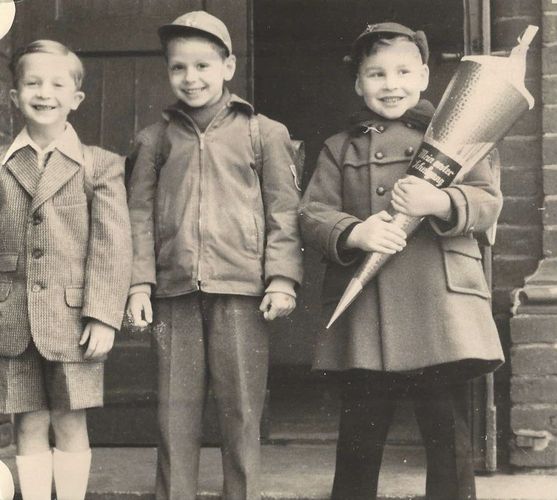 At the end of an extremely difficult school time, I was involved in setting up the first Berlin gay organization HAW, from which the SchwuZ emerged. In 1972 I met Lars-Åke, with whom my first relationship developed. In these three years I started studying law. This enabled me to move to Heidelberg and from there to commute to St. Gallen, where he worked as a teacher and during the following year to live with him in Hamburg. In order to be able to speak to his parents when visiting, I learned Swedish and after the end of our relationship a lifelong friendship with him and his sisters remained.
At the end of an extremely difficult school time, I was involved in setting up the first Berlin gay organization HAW, from which the SchwuZ emerged. In 1972 I met Lars-Åke, with whom my first relationship developed. In these three years I started studying law. This enabled me to move to Heidelberg and from there to commute to St. Gallen, where he worked as a teacher and during the following year to live with him in Hamburg. In order to be able to speak to his parents when visiting, I learned Swedish and after the end of our relationship a lifelong friendship with him and his sisters remained.
 While studying law in Berlin (Free University in the 1972 summer semester), Hamburg (1973/74 winter semester / 1974 summer semester) and Heidelberg (1972/73 winter semester / 1973 summer semester and 1974/75 winter semester to 1978/79 winter semester), I participated in the now disbanded Mannheim gay group SchAM and later also in the Heidelberg group „homo heidelbergensis“.
While studying law in Berlin (Free University in the 1972 summer semester), Hamburg (1973/74 winter semester / 1974 summer semester) and Heidelberg (1972/73 winter semester / 1973 summer semester and 1974/75 winter semester to 1978/79 winter semester), I participated in the now disbanded Mannheim gay group SchAM and later also in the Heidelberg group „homo heidelbergensis“.
During the period of professional bans (Berufsverbote), the third Russell Tribunal on human rights violations in the Federal Republic of Germany in 1978/79 was held in Frankfurt / Main in the summer of 1978 and in Cologne in January 1979. In order to ensure that cases of anti-gay discrimination are also negotiated and recognized as human rights violations, individuals from all over the old Federal Republic („West Germany“), all of whom were also active in gay groups in their respective places of residence, founded the NARGS group.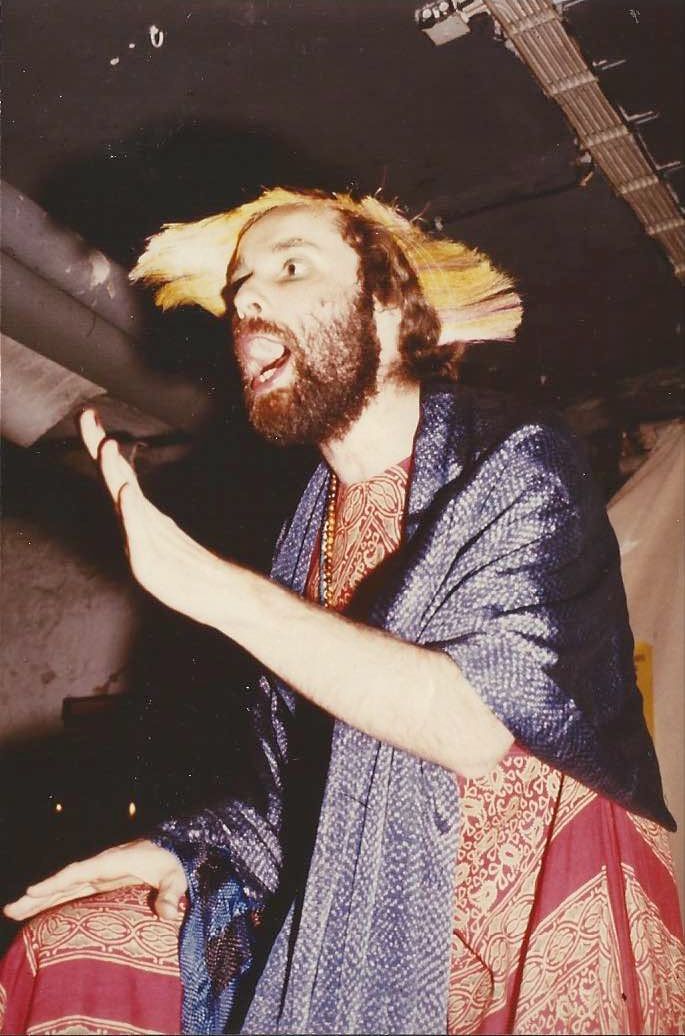 During the preparations for our contribution to the Russell Tribunal, a common need arose not only to identify grievances, but to be able to describe goals positively. Therefore, and in order not to always only speak of social constraints, to discuss theories and to bore the disinterested public with resolutions against any grievances, we decided to organize a big festival with a film, theater and music program. In the center of the western half of Germany, in Frankfurt am Main, we wanted to find out what we expected from life and not just explain what we feared. Such an event included political discussions about appropriate measures for a lifestyle opposite of the pattern of a nuclear family, of course. We also wanted to invite gays from other countries and therefore looked for a name that would evoke the right association regardless of the language. That’s why we „stole“ the name of a bar in Amsterdam that none of us had ever been to: Homolulu. Der Spiegel (a news magazin in the sytle of TIME in the US) reported in advance and thus helped us to achieve the hoped-for popularity.
During the preparations for our contribution to the Russell Tribunal, a common need arose not only to identify grievances, but to be able to describe goals positively. Therefore, and in order not to always only speak of social constraints, to discuss theories and to bore the disinterested public with resolutions against any grievances, we decided to organize a big festival with a film, theater and music program. In the center of the western half of Germany, in Frankfurt am Main, we wanted to find out what we expected from life and not just explain what we feared. Such an event included political discussions about appropriate measures for a lifestyle opposite of the pattern of a nuclear family, of course. We also wanted to invite gays from other countries and therefore looked for a name that would evoke the right association regardless of the language. That’s why we „stole“ the name of a bar in Amsterdam that none of us had ever been to: Homolulu. Der Spiegel (a news magazin in the sytle of TIME in the US) reported in advance and thus helped us to achieve the hoped-for popularity.
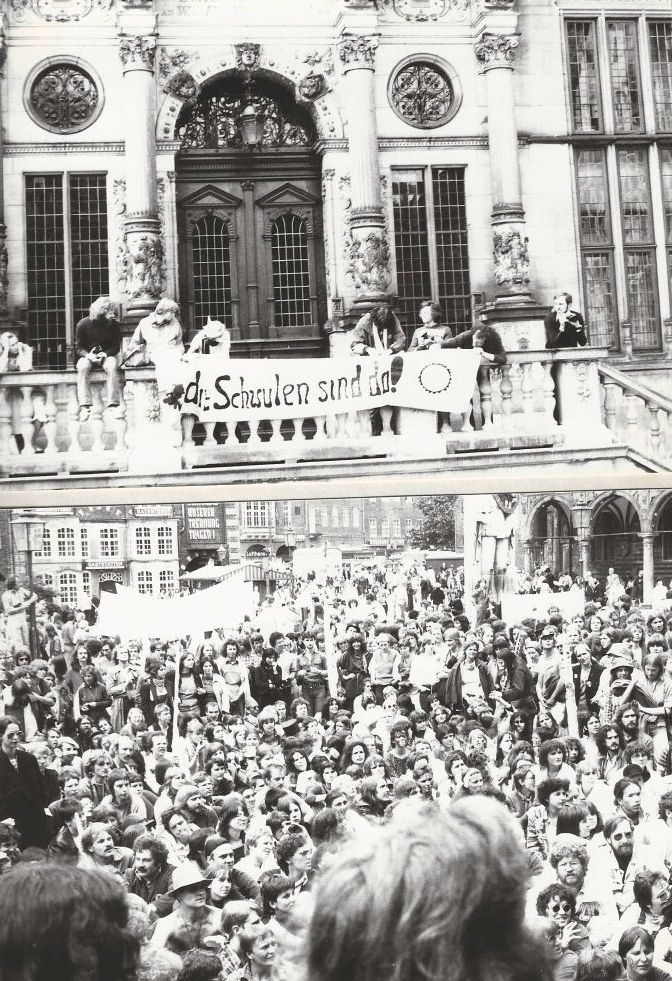 While we were in the last phase of the preparations, which lasted well over a year, the first gay pride events in Germany took place on June 30, 1979 in Bremen and West-Berlin. I Germany, they are called Christopher Street Day (CSD) parade, as the public demand for gay rights had started (again in the second part of the 20th century) with the riots in New York’s Christopher Street. During this time (since February 1979) I was a trainee lawyer in Berlin and drove to Frankfurt / Main at the end of July and beginning of August 1979 to take turns clearing away rubbish partly on the campus of the university and partly in a large marquee in Biegwald and give interviews. Because HOMOLULU had reached such a dimension that suddenly almost every German radio station and almost every newspaper reported about it. For the first time, gays featured in media coverage as a group of people rather than as victims of crime or sex offenders.
While we were in the last phase of the preparations, which lasted well over a year, the first gay pride events in Germany took place on June 30, 1979 in Bremen and West-Berlin. I Germany, they are called Christopher Street Day (CSD) parade, as the public demand for gay rights had started (again in the second part of the 20th century) with the riots in New York’s Christopher Street. During this time (since February 1979) I was a trainee lawyer in Berlin and drove to Frankfurt / Main at the end of July and beginning of August 1979 to take turns clearing away rubbish partly on the campus of the university and partly in a large marquee in Biegwald and give interviews. Because HOMOLULU had reached such a dimension that suddenly almost every German radio station and almost every newspaper reported about it. For the first time, gays featured in media coverage as a group of people rather than as victims of crime or sex offenders.
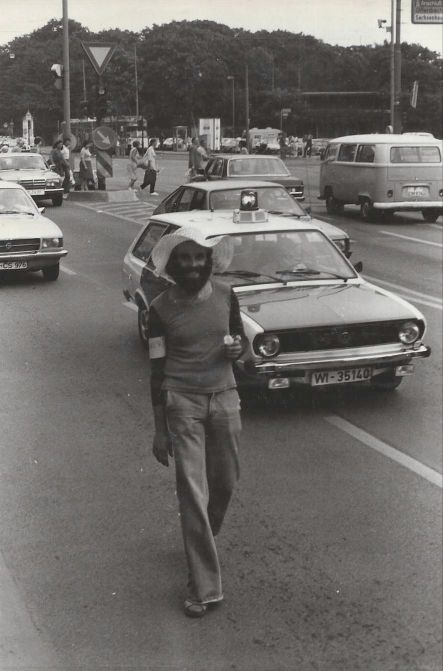 The Waldschloesschen was founded in 1980 by Goettingen members of the NARgS in order to continue the mixture of joint work and celebrations beyond the 10 days in Frankfurt.
The Waldschloesschen was founded in 1980 by Goettingen members of the NARgS in order to continue the mixture of joint work and celebrations beyond the 10 days in Frankfurt.
Because of my legal background, I helped found the necessary organisation, which has become its sponsoring association since the Waldschlösschen Academy Foundation has been established. Since then Ralf König has documented the rapid development in the change in the perception of gays in a humorous and self-critical manner like no other.
When the European Communities passed a directive obliging the member states to formulate laws against discrimination based on sex, the Humanist Union took this as an opportunity to draft a comprehensive anti-discrimination law. Under the umbrella of the aha, some lawyers and interested parties (including old HAW activists) founded a legal group that worked out a draft for parts of an anti-discrimination law that affected gays.
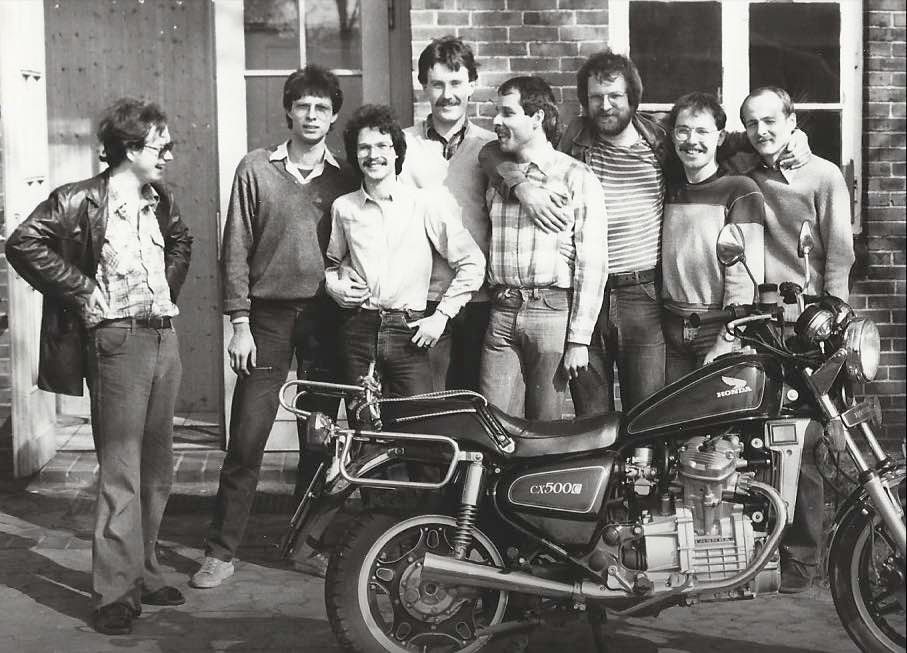 In April 1981 gay lawyers from all over the old Federal Republic met for the first time in a small hostel in Großenkneten (not far from Oldenburg) and decided to write a legal advisory under the name Schwule Initiative gegen den Paragraphensumpf (SchwIPs), which was published in 1982 under the title „recht schwul” (which could be read as “law gay“ as well as “quite gay”) was published by the “Verlag rosa Winkel” [publishing house]. The group of lawyers of the aha became part of this group, which has been calling itself BASJ – federal association of gay lawyers – since the beginning of the 1990s. BASJ published a second legal advisor at the end of 1991 under the title “Schwule im Recht” in PALETTE Verlag. Its second edition from 1994 formed the basis for the legal advice, which the LSVD continues to make available in an updated version on the Internet.
In April 1981 gay lawyers from all over the old Federal Republic met for the first time in a small hostel in Großenkneten (not far from Oldenburg) and decided to write a legal advisory under the name Schwule Initiative gegen den Paragraphensumpf (SchwIPs), which was published in 1982 under the title „recht schwul” (which could be read as “law gay“ as well as “quite gay”) was published by the “Verlag rosa Winkel” [publishing house]. The group of lawyers of the aha became part of this group, which has been calling itself BASJ – federal association of gay lawyers – since the beginning of the 1990s. BASJ published a second legal advisor at the end of 1991 under the title “Schwule im Recht” in PALETTE Verlag. Its second edition from 1994 formed the basis for the legal advice, which the LSVD continues to make available in an updated version on the Internet.
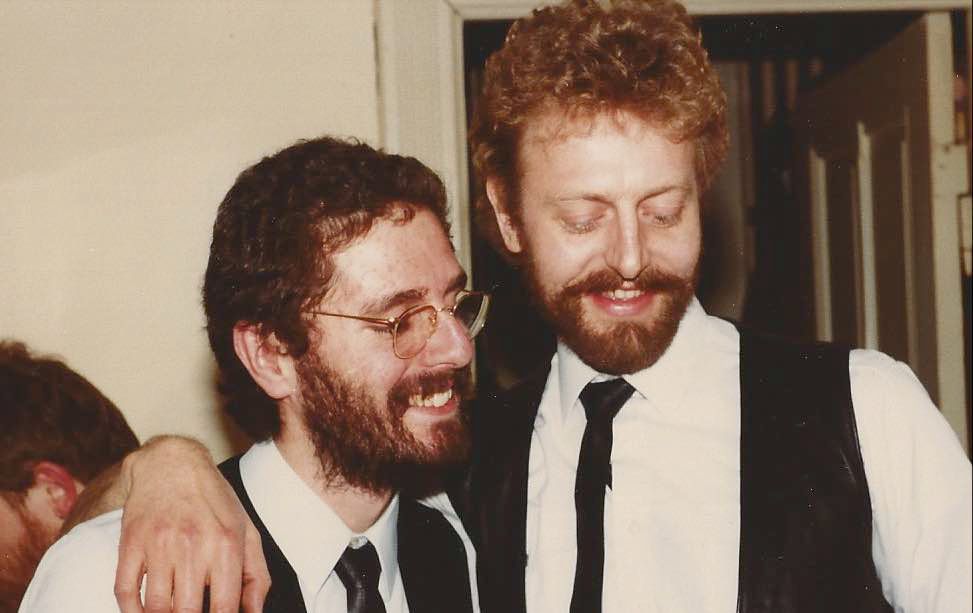 In 1979 I met Manfred Laube († 31.01.1990) and Joachim Valentin (* 30.08.1955 – † 15.10.1990), whom I already knew from working together in the NARgS, moved to Berlin. The three of us developed a very close relationship with each other. I flew to the USA for the first time with Manfred and spent fascinating nights in the legendary Mineshaft in New York. In 1981 I passed the second state examination in law, flew to the USA for the second time, and from there to Canada for the first time.
In 1979 I met Manfred Laube († 31.01.1990) and Joachim Valentin (* 30.08.1955 – † 15.10.1990), whom I already knew from working together in the NARgS, moved to Berlin. The three of us developed a very close relationship with each other. I flew to the USA for the first time with Manfred and spent fascinating nights in the legendary Mineshaft in New York. In 1981 I passed the second state examination in law, flew to the USA for the second time, and from there to Canada for the first time.
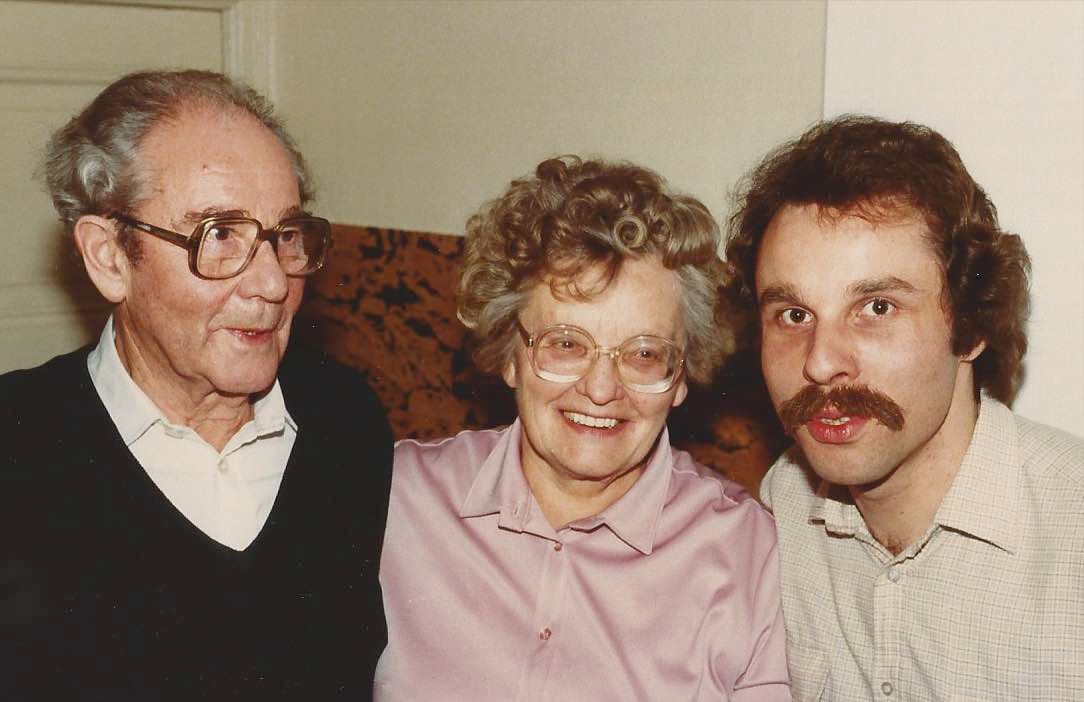 At the beginning of the 1980s we often drove together in Manfred’s car over the weekend to Amsterdam and spent beautiful days and wild nights at the parties in the “Pakhuis”. When my parents moved into an age-appropriate apartment, I moved – for a few years together with Joachim – to the stove-heated apartment on the fourth floor with a view of the Spree at Wikingerufer 5, where I grew up. When Manfred was transferred to Hamburg for a few years, we visited him there frequently. In 1985 my little judicial kiosk became part of a small law firm at Brandenburgische Strasse 38 and after we separated again, I moved my office to Bornstrasse 2 in Berlin-Steglitz in 1988, until I happily finished this phase of my working life on November 15, 1989.
At the beginning of the 1980s we often drove together in Manfred’s car over the weekend to Amsterdam and spent beautiful days and wild nights at the parties in the “Pakhuis”. When my parents moved into an age-appropriate apartment, I moved – for a few years together with Joachim – to the stove-heated apartment on the fourth floor with a view of the Spree at Wikingerufer 5, where I grew up. When Manfred was transferred to Hamburg for a few years, we visited him there frequently. In 1985 my little judicial kiosk became part of a small law firm at Brandenburgische Strasse 38 and after we separated again, I moved my office to Bornstrasse 2 in Berlin-Steglitz in 1988, until I happily finished this phase of my working life on November 15, 1989.
 When the threat from AIDS took on clear contours in 1983, I helped the nurse Sabine Lange and the publisher Bruno Gmünder to found the Deutsche AIDS-Hilfe e.V. (DAH) and, together with Sabine, who had been doing the examinations and hepatitis B vaccinations in the then state vaccination institute / Tropical Medicine Department had already become a confidante in the gay scene, and Thomas, the host of the “Knolle” bar, was part of the first board member of the then tiny DAH. The organisation’s first office was in the kitchen of my office at Niebuhrstrasse 71. On the initiative of the meeting of Berlin gay groups, which was sometimes mockingly called the Thomas Brüggemann Show because of its outstanding role as organizer, I ran in 1985 in the Wedding district for the Alternative List (AL) as a non-party candidate for the Berlin House of Representatives. Although Herbert Rusche had already successfully stood as a candidate for DIE GRÜNEN in the Bundestag in 1983, I became the first openly gay member of parliament in Germany because I took up my mandate immediately, while Herbert had to wait for the end of the first half of the legislative period. He therefore took office as a member of the federal parliament (Bundestag) in the October 1985.
When the threat from AIDS took on clear contours in 1983, I helped the nurse Sabine Lange and the publisher Bruno Gmünder to found the Deutsche AIDS-Hilfe e.V. (DAH) and, together with Sabine, who had been doing the examinations and hepatitis B vaccinations in the then state vaccination institute / Tropical Medicine Department had already become a confidante in the gay scene, and Thomas, the host of the “Knolle” bar, was part of the first board member of the then tiny DAH. The organisation’s first office was in the kitchen of my office at Niebuhrstrasse 71. On the initiative of the meeting of Berlin gay groups, which was sometimes mockingly called the Thomas Brüggemann Show because of its outstanding role as organizer, I ran in 1985 in the Wedding district for the Alternative List (AL) as a non-party candidate for the Berlin House of Representatives. Although Herbert Rusche had already successfully stood as a candidate for DIE GRÜNEN in the Bundestag in 1983, I became the first openly gay member of parliament in Germany because I took up my mandate immediately, while Herbert had to wait for the end of the first half of the legislative period. He therefore took office as a member of the federal parliament (Bundestag) in the October 1985.
At Easter 1987 I resigned with the entire parliamentary group in order to leave the second half of the electoral term to our successors. This replacing of the elected persons by the next persons on their party’s list was called “rotation”and should counteract the typical phenomenon that politicians lose touch with their voters soon after the start of their careers.
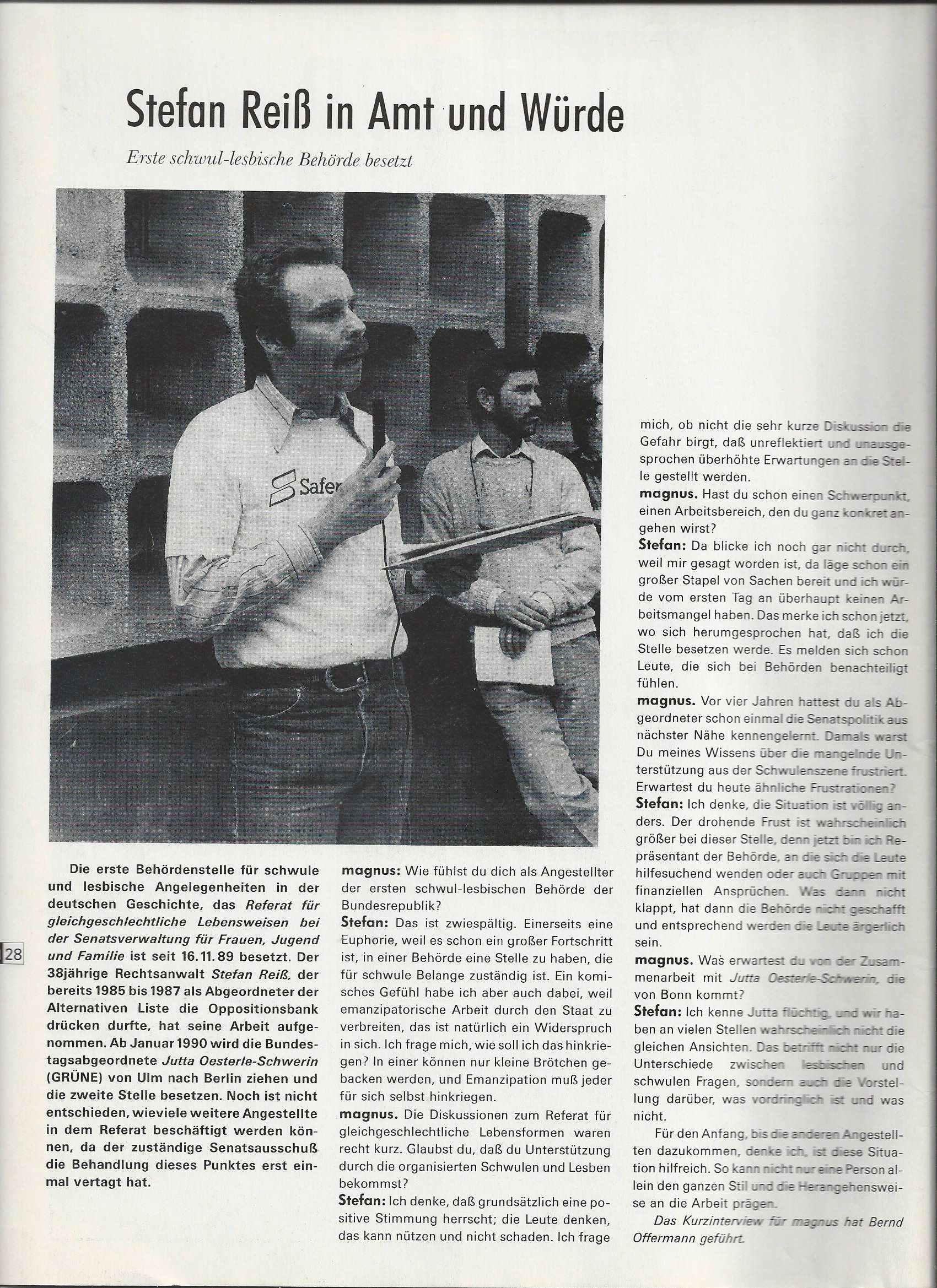 Before I plunged back into my legal life, together with Sabine Mehlem I wrote the manuscript for a legal advisor book, the first compendium on the then hotly controversial legal issues in connection with AIDS. Her lover at the time, the journalist Juergen Wolff, made sure that our texts were not only correct, but also understandable for non-lawyers. Since I was allowed to present the book that Rowohlt had published in the rororo-aktuell series on Berliner Fruehstuecksfernsehen (breakfast TV) at the end of 1988 and was invited as an expert on the ZDF (one of only two nation wide TV programs at this time) show „Doppelpunkt“ because of this publication, I was able to do this as the only legal form of advertising for my little law firm. Of course, the three of us also worked on the implementation of the legal advisor project planned by DAH long before. In “AIDS and HIV in Law”, published by Palette Verlag in 1991, precedences made in the meantime could be taken into account.
Before I plunged back into my legal life, together with Sabine Mehlem I wrote the manuscript for a legal advisor book, the first compendium on the then hotly controversial legal issues in connection with AIDS. Her lover at the time, the journalist Juergen Wolff, made sure that our texts were not only correct, but also understandable for non-lawyers. Since I was allowed to present the book that Rowohlt had published in the rororo-aktuell series on Berliner Fruehstuecksfernsehen (breakfast TV) at the end of 1988 and was invited as an expert on the ZDF (one of only two nation wide TV programs at this time) show „Doppelpunkt“ because of this publication, I was able to do this as the only legal form of advertising for my little law firm. Of course, the three of us also worked on the implementation of the legal advisor project planned by DAH long before. In “AIDS and HIV in Law”, published by Palette Verlag in 1991, precedences made in the meantime could be taken into account.
When I had to earn my living exclusively as a lawyer again from mid-1987, I was appointed to look after an alcoholic whose neglected apartment had to be closed. The sense of responsibility for a person who wakes up from a coma in a hospital, completely penniless and frail, burdened me so much that the social worker responsible for him at the Jewish hospital advised me to go to a self-help group for relatives of alcoholics, because I apparently myself behaved exactly as it is typical for many relatives. That same evening in July 1987 I went to an AL-ANON meeting for the first time, which took place just two streets away. Even after the support and my legal life had long ended, I went to AL-ANON regularly for many years.
In the summer of 1989 I accompanied my roommate to the swimming pool because he was hoping to meet a flirt again but was afraid of being alone in the indoor pool on a hot summer day. Since I didn’t have to go to an outdoor pool, I went with them and met my husband Ehrhard, whom Wolfgang’s Flirt had brought with him for the same reason. When we registered our civil partnership at the Charlottenburg registry office on the 13th anniversary, the two saw each other again after a long time as groomsmen.
Ehrhard and I like to travel and we like to have visitors. You often have to spend a lot of money on a moderately comfortable bed. Those who do not have to live in a hotel get to know a foreign city in a completely different way than someone who is limited to tourist information. That is why we became members of L/GHEI (Lesbian and Gay Hospitality Exchange International), an association whose members accommodate each other for up to three nights on request, thus giving visitors personal access to their city.
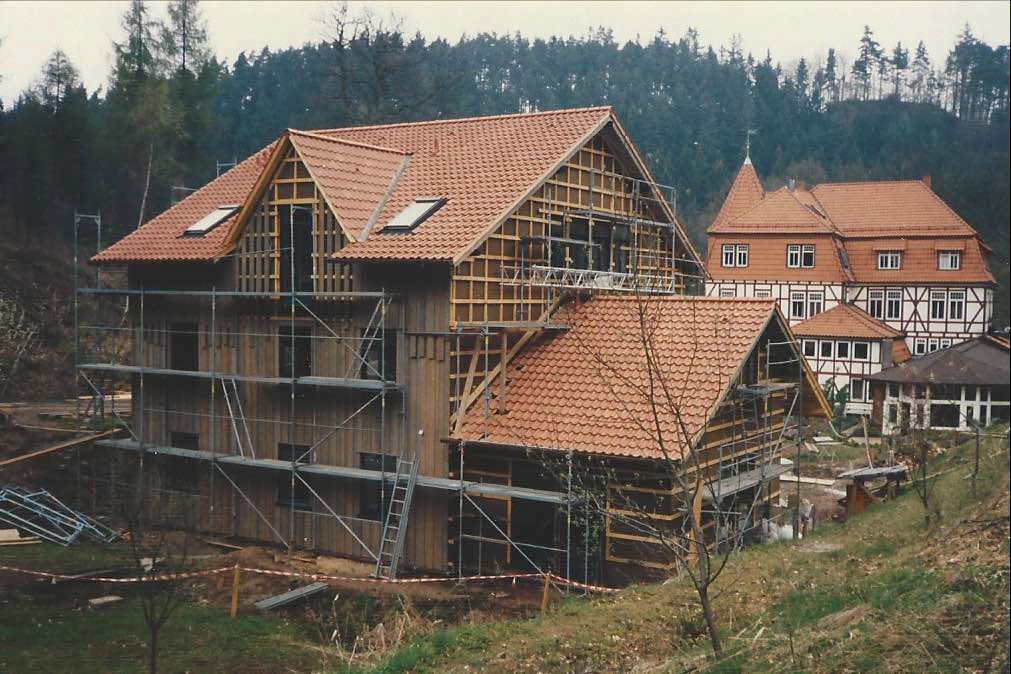 When the first “red-green coalition” (SPD, the German equivalent to the British Labour Party and the Green Party) wanted to set up an anti-discrimination office for lesbians and gays in Berlin in 1989, I applied for this job. When the department for same-sex lifestyles was founded in the former Senate Department for Women, Youth and Family, I gave up my law office. On November 16, 1989, together with Prof. Dr. Ilse Kokula, I became a civil servant responsible for equal opportunities for lesbian and gay persons. This was just a few days after the borders of the GDR were opened. The department for same-sex lifestyles, which has also been responsible for the interests of transsexuals since 1990, now works as part of the State Office for Equal Treatment – Against Discrimination (LADS) at the Senate Department for Labor Integration, and Women and can proudly list important publications.
When the first “red-green coalition” (SPD, the German equivalent to the British Labour Party and the Green Party) wanted to set up an anti-discrimination office for lesbians and gays in Berlin in 1989, I applied for this job. When the department for same-sex lifestyles was founded in the former Senate Department for Women, Youth and Family, I gave up my law office. On November 16, 1989, together with Prof. Dr. Ilse Kokula, I became a civil servant responsible for equal opportunities for lesbian and gay persons. This was just a few days after the borders of the GDR were opened. The department for same-sex lifestyles, which has also been responsible for the interests of transsexuals since 1990, now works as part of the State Office for Equal Treatment – Against Discrimination (LADS) at the Senate Department for Labor Integration, and Women and can proudly list important publications.
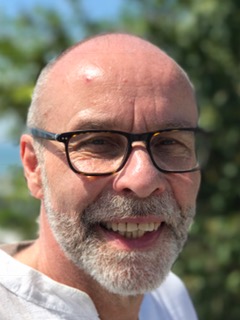 In 1992 I had the opportunity to be assigned to the legal department of the Senate Department for Youth and Family at the time. I was permanently transferred there at the end of 1993. The organizational changes that followed each time the Senate was formed meant that my colleagues from the „Same-Sex Lifestyles“ department were meanwhile transferred several times to another Senate administration and became part of the State Anti-Discrimination Agency, while I gradually developed into a specialist in law concerning youth welfare and later the subject “general affairs of the German Sinti and Roma”. During the long-term cooperation with the regional association of German Sinti and Roma Berlin-Brandenburg e.V., I learned a lot about the other point of view of a person who was not directly affected / outsider on the arduous work against prejudice and found a friend in Petra Rosenberg, who was the chairwoman for a long time.
In 1992 I had the opportunity to be assigned to the legal department of the Senate Department for Youth and Family at the time. I was permanently transferred there at the end of 1993. The organizational changes that followed each time the Senate was formed meant that my colleagues from the „Same-Sex Lifestyles“ department were meanwhile transferred several times to another Senate administration and became part of the State Anti-Discrimination Agency, while I gradually developed into a specialist in law concerning youth welfare and later the subject “general affairs of the German Sinti and Roma”. During the long-term cooperation with the regional association of German Sinti and Roma Berlin-Brandenburg e.V., I learned a lot about the other point of view of a person who was not directly affected / outsider on the arduous work against prejudice and found a friend in Petra Rosenberg, who was the chairwoman for a long time.
Since 1989, Professor Dr. Andreas Meyer-Hanno (* February 18, 1932 – † September 7, 2006), who for years had not only contributed to discussions in the Braunschweig and Frankfurt gay groups, but had also filled many financial holes and therefore carried the nickname Hannchen Mehrzweck (about: Joan Multipurpose), the idea of a self-help group called “Homosexuelle Selbsthilfe (HS) e.V.” became supplemented by a non-profit foundation. Again, my knowledge of the law seemed to naturally lead to the fact that when the “Hannchen-Mehrzweck-Stiftung (hms)” was approved by the Berlin foundation supervisory authority in 1991, I worked with him and sat with him and the Frankfurt based physician Dr. Stefan Schlesinger on the board of directors. After the end of the first term of office, Stefan Schlesinger did not run again and in his place Arne Seydak was elected to the foundation board by the advisory board of the hms. After a total of 10 years, all three of us left office at the end of 2001 and made room for a somewhat larger executive board, which has long since ceased to be made up of only men.
In 2004, Henning Mielke wanted to found an association that supports the children of parents with addictions. Children from families with addiction are mostly completely inconspicuous for a long time and are therefore not recognized by the youth welfare service as in need of support because they themselves do not (yet) consume alcohol or illegal drugs. Therefore, I drafted an association statute for the establishment of NACoA-Deutschland e.V.
In 2005 my husband was elected to the board of the Homosexuelle Selbsthilfe e.V.. When no candidate for the third board member could be found in 2013, I took on this task. In April 2017 we left the HS board – Ehrhard after six terms in a row and I after another two terms. Since then I have only been supporting the association’s work in processing applications for legal aid.
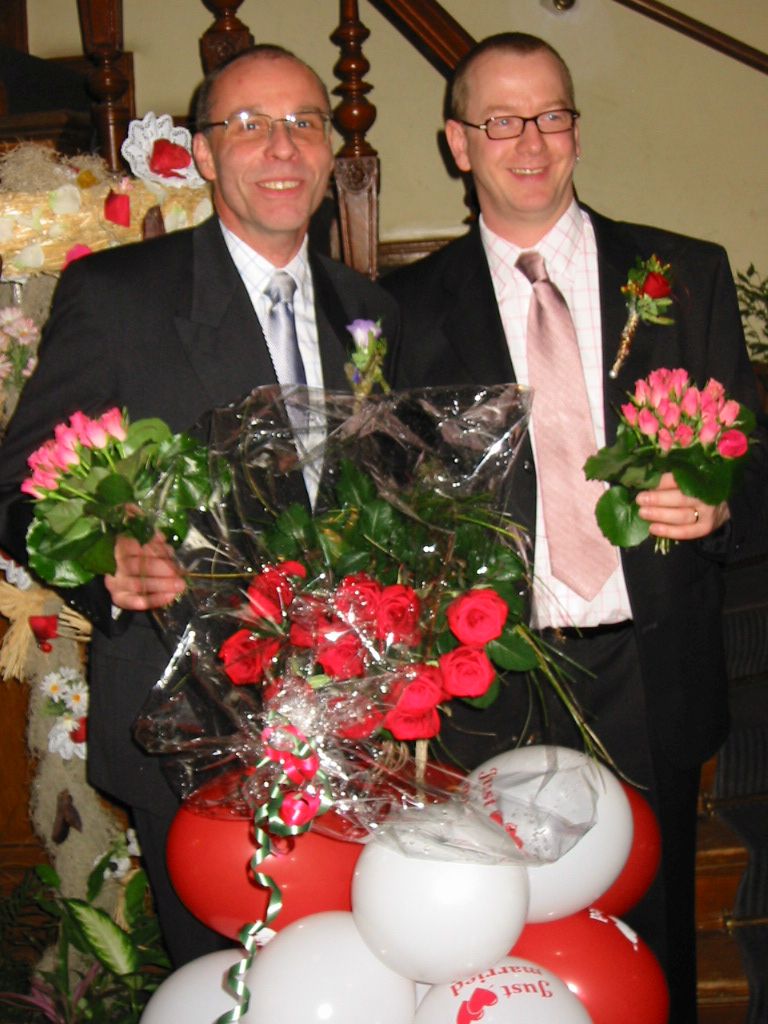 On the 30th anniversary of our meeting, Ehrhard and I had our partnership converted into a marriage.In order to give the Waldschloesschen Academy a stable structure in the long term, a foundation was also established at the beginning of 2004, and I have been a member of its board of trustees ever since.
On the 30th anniversary of our meeting, Ehrhard and I had our partnership converted into a marriage.In order to give the Waldschloesschen Academy a stable structure in the long term, a foundation was also established at the beginning of 2004, and I have been a member of its board of trustees ever since.
In order to give the Waldschloesschen Academy a stable structure in the long term, a foundation was also established at the beginning of 2004, and I have been a member of its board of trustees ever since.
At the end of 2018 I became a founding member of the memorial association “Zwangslager Berlin-Marzahn e.V.”, which aims to preserve the memory of the atrocities to which the German Sinti and Roma were exposed from 1936 until the end of the Nazi era and to keep the memory of the victims alive.